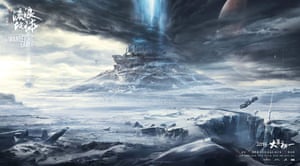Wandering Earth
Shanghai Fortress
Pathfinder
--
https://www.theguardian.com/world/2019/feb/11/china-first-blockbuster-sci-fi-film-wandering-earth
China challenges Hollywood with own sci-fi blockbuster
Wandering Earth on track to be one of highest-grossing films in country’s history
China has entered the cinematic space race. Wandering Earth, the country’s first blockbuster sci-fi film, is on track to be one of the highest-grossing films in China’s history.
The film has brought in more than 2bn yuan (£232m) in the six days since its release on 5 February, lunar new year. So far, it is the highest-grossing film released over the holiday season, a peak time for the Chinese box office.
Set in the distant future, the governments of Earth, confronted with annihilation from an unstable sun, have strapped thrusters on to the planet, ejecting it out into the universe in search of a new home. But as the Earth approaches Jupiter, a malfunction in the system puts it on course to crash into the planet.
Described as a cross between Armageddon and 2001: A Space Odyssey, the film is seen by some as the dawn of Chinese sci-fi – a genre that has long been dominated by Hollywood. Several other Chinese-made sci-fi films are due to debut this year, including Shanghai Fortress, about an alien invasion, and Pathfinder, which follows a spaceship that has crashed on a deserted planet.
Frant Gwo, the director of Wandering Earth, told the government web portal China.org.cn: “2019 could be remembered as year zero of Chinese science-fiction blockbusters. It is not just about one successful movie but about the emergence of multiple films.”
China is already home to a thriving science and speculative fiction literary scene. Wandering Earth is based on the work of Liu Cixin, the author of the Three-Body Problem series and the first Chinese author to win a Hugo award,
“The Wandering Earth fills the gap in Chinese science fiction movies. It means that China’s science fiction movies have officially set sail,” one fan of the film wrote on the review site Douban.
China’s film market is expected to overtake the US as the world’s largest by 2022. In the first quarter of last year, the Chinese market surpassed that of the US, with films such as Ready Player One and Pacific Rim enjoying bigger box office debuts in China than the US.
Yet, Chinese studios have not invested in sci-fi films. According to Liu, the author of the novel Wandering Earth, the main difference between Chinese and US audiences is trust.
“Building trust between producers, investors and the audience is the biggest challenge here,” he told the state broadcaster CCTV. “Not so many people have faith in a Chinese sci-fi movie,” he said.
Indeed, Wandering Earth was slow to get off the ground in the first few days of its release, with many sceptical of a Chinese-made sci-fi film. As Wandering Earth received positive reviews for its special effects, pacing and arresting views of the Earth as seen from space, it quickly gained momentum.
For Chinese moviegoers, accustomed to sci-fi films made by US studios, Chinese elements such as references to spring festival, or Chinese new year, mahjong and road signs common in China (anquan diyitiao, “safety number one”) were a welcome change.
Some noted that unlike many Chinese blockbusters, Wandering Earth dials back on the patriotism. Rescue teams from around the world scramble to get the thrusters back up and running. A Russian soldier sacrifices his life to help a Chinese colleague.
“This is not a patriotic film but a film about humans saving themselves,” one reviewer said.
Critics of the film have pointed out plot holes, cloying sentimentality and one-dimensional female characters – traits Wandering Earth shares with its Hollywood peers.
In response to plot criticisms about the necessity of ejecting Earth from the solar system, Liu said: “Of course we don’t need to escape soon … That’s why it’s a movie instead of a [real-life] crisis.”
Additional reporting by Wang Xueying





